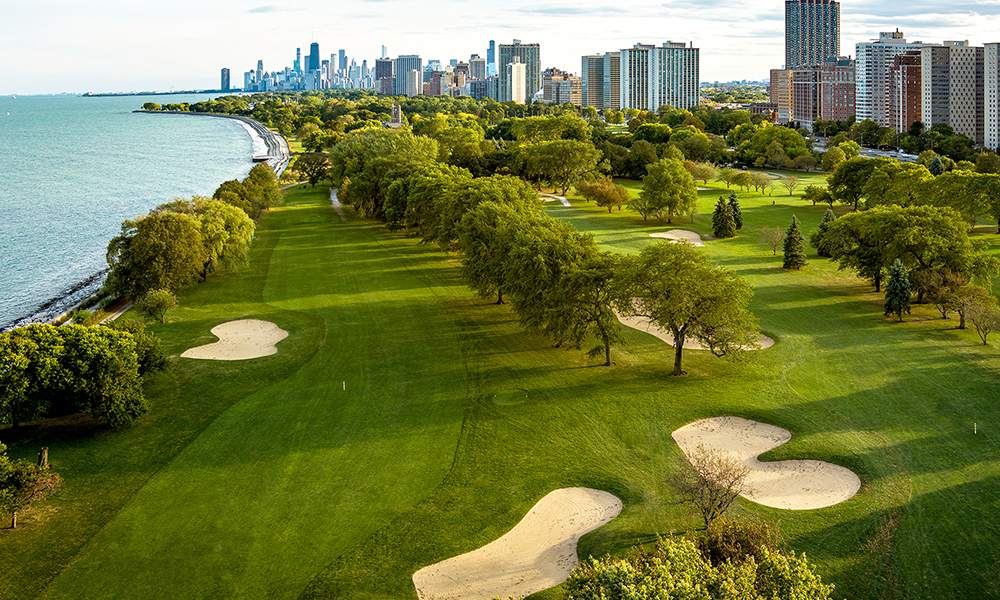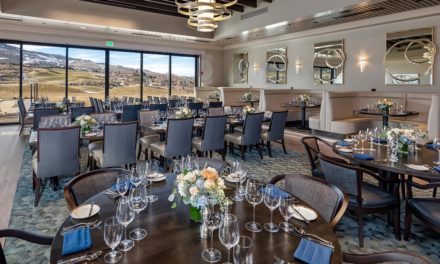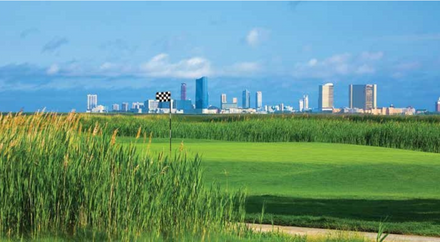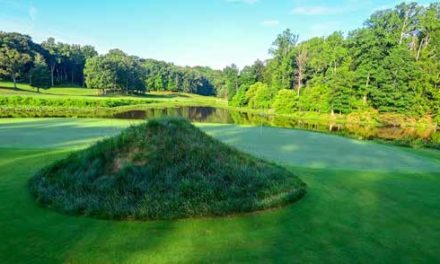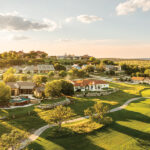Cover Story
GOLF FOR EVERYONE
Troon’s Muni Courses are Full of Life
It’s where you will find golfers of all sizes and handicaps. Young and old, female and male. Veterans and beginners. A place where leagues build lasting friendships and juniors learn the basics of a game they can play for the rest of their life. The place? Your local municipal course, or “muni” for short. Built to welcome all, they often become more than just an affordable on-ramp to the game of golf. Sometimes they even become something of a second home.
Municipal courses managed by Troon Golf and Indigo Sports are having a positive impact on their local communities every day. The list of facilities stretches coast-to-coast, from Jefferson Park in Seattle to Falmouth Country Club in Massachusetts, with plenty of options in between.
“Municipal golf plays an integral role throughout the country in terms of creating affordability, providing access to the game, and inviting diversity,” said Phil Green, executive vice president of operations, Troon. “Oftentimes in city cores, municipal courses can serve as social gathering places and green open spaces for the local community to enjoy.”
Here’s a look at several of Troon’s more active munis.
CINCY SWINGS
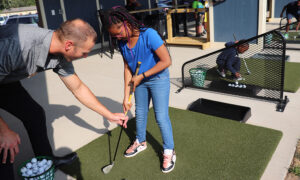 Growing up in Cincinnati, Rob Higby used take a public bus after school and head to Reeves Golf Course, where he would play the nine-hole par-3 course. These days, as the supervisor of golf at the Cincinnati Recreation Commission (CRC), he’s come full circle, overseeing six golf courses with 108 holes overall, including the nine-holer he remembers well from his youth.
Growing up in Cincinnati, Rob Higby used take a public bus after school and head to Reeves Golf Course, where he would play the nine-hole par-3 course. These days, as the supervisor of golf at the Cincinnati Recreation Commission (CRC), he’s come full circle, overseeing six golf courses with 108 holes overall, including the nine-holer he remembers well from his youth.
“It is nice to be engaged now on the other side with bringing kids from the inner city and helping them experience golf,” he said. The roster of layouts ranges from Avon Fields Golf Course, the oldest public course west of the Allegheny Mountains, to Reeves, which added an 11-bay Toptracer range last year.
“We see a melting pot of customers,” said Higby. “A goal of the Cincinnati Recreation Commission is to provide affordable access for the entire community. We really pride ourselves on establishing prices that are top of the field when it comes to affordability.”
In addition to First Tee programs, CRC Community Days are now in their fourth year. “Junior golfers are brought in from recreation centers around the city to Reeves two days a week for eight weeks and go through two hours of instruction, eat lunch, and then finish back at their rec centers,” said Higby. “We’ve sold out for 230 participants in the past. We’re adding afternoon sessions this year and expecting to potentially reach 450-500 juniors through that program.”
 He also notes that Avon Fields assistant professional Ron Dumas has run a Reaching Out to Kids Program for the past 22 years that serves up to 300 kids annually on Saturday mornings. Last year, Dumas won the NAACP Cincinnati Chapter President’s Award, that group’s highest honor, for his work and outreach to juniors in the inner city. “That’s been a great success story,” said Higby. “He’s probably had more than 30 kids from his program who have received golf scholarships.”
He also notes that Avon Fields assistant professional Ron Dumas has run a Reaching Out to Kids Program for the past 22 years that serves up to 300 kids annually on Saturday mornings. Last year, Dumas won the NAACP Cincinnati Chapter President’s Award, that group’s highest honor, for his work and outreach to juniors in the inner city. “That’s been a great success story,” said Higby. “He’s probably had more than 30 kids from his program who have received golf scholarships.”
The CRC courses are well-used, with a recent increase of 35,000 rounds annually from pre-pandemic levels. “The record revenues have allowed us to begin work on a six-year capital plan that will address some deferred maintenance, and renovations of buildings and cart paths, so we’re going to reinvest quite a bit of money into the facilities to ensure that the guest experience continues to be enhanced,” said Higby, who noted that the CRC has offered youth golfers discounted golf for over 50 years through its Youth Golf Association (YGA). “We are self-supportive and do not accept any tax dollars from residents. It does make it challenging from time to time, but with the knowledge that the management teams from Indigo and Troon have brought to the table, these courses are in the best shape I have ever seen them.”
FAIRWAYS IN THE FOREST
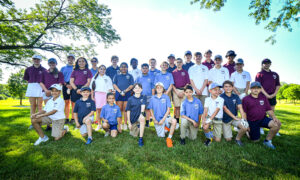
The Cook County Forest Preserve in and around Chicago is home to 11 properties with 10 courses and a stand-alone driving range. “The uniqueness of the county courses is that they are inside the Forest Preserve, which includes almost 70,000 acres throughout Cook County,” said Andrew Johnson Jr., regional director of operations, Troon. “You can be inside a dense urban area, go around the block, and you’re inside a forest. It’s really cool and unique in the country. It gives people in a largely concrete world a chance to get out and see nature. The courses are not surrounded by houses, and they crawl with wildlife.”
Affordability is an important part of the golf offerings. “Our courses on weekends can go from $32 to $80 for 18 holes, and nine holes can go for $20 if walking or $30 for riding,” said Johnson. “That gives people an opportunity to pick and choose what they want. Overall condition-wise, they’re pretty equal. You have people who only play one of the courses and love it, and you have others who use one for practice and then on weekends play some of the higher-end courses. There are ways to get to all of them fairly easily by car, train, or bus.”
Driving ranges at George W. Dunne National Golf Course, Highland Woods Golf Course, and Harry Semrow are where growing the game initiatives are focused. Overall, play at the Forest Preserve courses is intentionally down thanks to a 2020 expansion of tee time intervals. “As a portfolio we were doing upwards of 350,000 rounds prior to COVID,” said Johnson. “Now it’s about 325,000 rounds by design, which means less wear and tear on the courses. Plus, it helps with quicker rounds.”
A Forest Preserve Youth Golf Fair is scheduled for June 9 at George W. Dunne National this year. “The focus is on getting kids from the South Side of Chicago out to the course for the day,” said Johnson. “We’ll have activities on the driving range, show off the agronomy equipment, set up some Foot Golf and Frisbee Golf, and have instructors give lessons. We really open the doors that day.”
CITY GAME
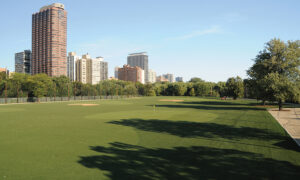
Chicago is a city of neighborhoods, and each neighborhood has its own personality. Thanks to the Chicago Parks District (CPD), a handful of them also have a municipal golf course. Matt McIntee, a 40-year resident and senior vice president, business development, Troon, has played them all.
“People who don’t know Chicago tend to say that some of the courses are in more challenging neighborhoods, but nothing could be further from the truth,” said McIntee. “The neighborhoods are unique and interesting, and the courses are like the social epicenter. The courses are the one thing that brings everyone together. When I visit the courses, the patrons always say that access, affordability, and youth programming matter the most. They just want to make sure the courses are there for generations to come. There is significant camaraderie between the patrons and our staff.”
City residents embrace the courses (five nine-holers and one 18-hole layout) and there is a thriving junior and Millennial population, in particular at the Sydney R. Marovitz Golf Course, the Diversey Driving Range, and Jackson Park Golf Course. “While it’s important to attract new golfers, I feel like our mission is to create new avenues of access for all and to provide programming for all types of players,” said McIntee. “We really work hard to live the mission of diversity, equity, and inclusion every day at every property. Our team thinks outside the box when it comes to programming and activities so that our patrons have a deeper appreciation not only for golf, but also for the parks.”
That’s possible at the nine-hole Robert A. Black Golf Course in the wooded Rogers Park on the city’s North Side. “You’ll see a diverse group of First Tee juniors, local high school teams, and older golfers who have played it for as long as 60 years,” said McIntee. “This year in an effort to encourage patrons to experience the diversity, we are going to promote the ‘Chicago Park District Golf Trail.’ Most of our patrons purchase the Players Advantage Pass, and it will make playing all more affordable.”
The busiest of the courses is Sydney Marovitz, which was renamed in 1991 for a local lawyer and former Chicago Park District commissioner but still gets called its original name, Waveland, by longtime locals. “That’s the busiest place in town,” McIntee said of the layout overlooking Lake Michigan on the city’s North Side. “It draws competitive golfers, plus large women’s, men’s, and senior golf leagues. It’s also home to The First Tee of Greater Chicago, and a hub for youth programming.”
Also incredibly busy is the double-decker driving range at Diversey in the heart of Lincoln Park. “Any day of the week you can see someone walking down a path in Lincoln Park with a set of clubs on their shoulder heading to Diversey,” said McIntee. “It’s a truly urban golf experience in one of the city’s most beautiful neighborhoods.”
Jackson Park, the only 18-hole course in city limits, offers very diverse programming. “As a city resident, Jackson Park has great meaning for me, but far more to the neighborhood residents,” said McIntee. “It is a truly historic golf course and will soon be a neighbor of the Barack Obama Presidential Center.”
GENERATIONS OF GOLFERS
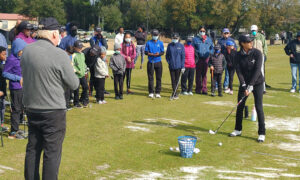
“Munis are golf for everyone.” So says Dan Zimmer, vice president of operations, Troon, and that’s the focus at three courses in Jacksonville, Florida: Bent Creek’s 18 holes are found on the city’s west side; right downtown is the Brentwood nine-holer; and the nine-hole Blue Cypress is located just east of downtown.
“The great thing about all three facilities is that because of the First Tee programming at each, they pull in a lot of juniors,” said Zimmer. “But we also have active leagues and groups for women and men, plus seniors, and we also offer discounts for military personnel. And they’re all good courses, so even better players can have an enjoyable round.”
For the city of Jacksonville, the courses bring in that next generation of golfers who wouldn’t traditionally play golf and give them the opportunity for the life lessons as well as being a part of the sport, according to Daryl Joseph, director of parks, recreation, and community service for the City of Jacksonville. “Our affordable pricing is intentional to ensure that the fee structures are open and available to attract people, rather than deter them from playing,” he said.
Blue Cypress opened in the early 2000s but was closed from 2016 to 2020. Troon and Indigo Sports then partnered with the city, and thanks to a large push from the local community, the course re-opened in 2021. “Outside of the greens, all the grass is mowed at the same height,” said Zimmer. “It’s easy to maintain and enjoyable for golfers. There are no real penal areas. The goal was to create a facility where someone coming out to play golf for the first time could go out and have good time. Also, an avid golfer could also come out and have a great experience, too.”
Brentwood, which costs just $13 to play and walk nine holes, draws on a very diverse downtown population and a rich history that was featured in a 2021 Golf Channel segment. Bent Creek, which opened in 1989, joins the other two facilities in having popular driving ranges. “Those are some of the best ranges in the area, so they really do provide a good opportunity to practice, or for the novice golfer to hit a bucket of balls in a comfortable atmosphere,” said Zimmer.
CAPITOL UPGRADES
Three golf courses that have long been integral parts of the Washington D.C. community are starting new chapters thanks to the National Links Trust (NLT), a 501(c)(3) nonprofit established to positively impact communities by promoting and protecting affordable, accessible, and engaging golf course architecture at municipal courses throughout the United States. Currently in the third year of a 50-year lease with the National Parks Service, the NLT has partnered with Troon at Langston Golf Course, Rock Creek Park Golf, and East Potomac Golf Links.
Rock Creek is in the midst of an extensive planning and permitting process, one that started recently at Langston. “Our hope is to be in the ground doing the clubhouse and driving range at Rock Creek in late fall 2023, with completion a year later, at which point we would start on the nine-hole course and par-3 course,” said Will Smith, NLT co-founder and interim executive director. “Then hopefully go straight from there to work on the course at Langston.”
Further highlighting municipal golf will be the inaugural National Links Trust Championship being held Sept. 30 – Oct. 1
at East Potomac Golf Links, where NLT work is in early stages. The event will be open exclusively to public-access golfers aged 25 and over, with qualifiers at municipal courses around the U.S., with women’s and men’s divisions. “We believe public facility golfers should have the opportunity to play in a national championship competing against their peers,” said Sinclair Eaddy, Jr., senior advisor at National Links Trust and member of the USGA Executive Committee. As a leader in the municipal golf space, National Links Trust is honored to present this new and exciting championship.”
This trio of affordable and accessible courses cater to both people who have never picked up a club and those who have played all their life. That’s a better definition of a muni course than just simply a course being owned by a municipality, according to Smith.
“Too often in the golf world, we measure success by dollar signs,” he said. “But these courses here in D.C. and others like them across the country provide so much more to their communities that we are looking at things holistically and trying to see how we can improve these facilities to make greater impacts in their communities.”

